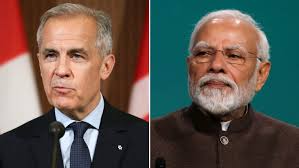On India, Canada table: Group against transnational crimes

India and Canada have agreed to form a joint group to tackle transnational crimes. These include extremism, terrorism financing, organized crime, and human trafficking. This step comes after months of tense diplomatic ties.
Officials from both countries held talks in New Delhi last week. They decided to re-establish cooperation on security issues, which had paused since 2023.
A Cautious Diplomatic Reboot
Relations soured last year after Canadian Prime Minister Justin Trudeau accused India of involvement in the killing of Khalistani separatist Hardeep Singh Nijjar. India denied any role in the incident. It also accused Canada of ignoring threats from extremist elements based there.
Now, both sides aim to restore some trust. India’s Ministry of External Affairs said the two countries will create a working group to target crimes that threaten national security. The group will focus on preventing and investigating these crimes through direct cooperation.
Canadian officials also confirmed the development. They emphasized the need to fight organized crime, cyber threats, and illegal financing networks together.
What the Joint Group Will Do
The group will include law enforcement officials, intelligence officers, and security experts. It will focus on:
- Stopping Extremism and Radicalization: Both sides will share intelligence and work to dismantle violent networks.
- Fighting Human Trafficking: They plan to track illegal migration routes and stop smuggling gangs.
- Curbing Terror Financing: The team will work to block money flows that fund terror groups.
- Preventing Cybercrime: Technical experts will help investigate cross-border digital crimes.
This partnership could help both countries deal with rising international crime trends.
Signs of a Diplomatic Thaw?
This move could mark the start of a diplomatic reset. India is ready to cooperate on crime but remains firm on its concerns about Khalistani extremism. A former Indian diplomat noted that the joint group might help build common ground without either side giving up on key issues.
India has often criticized Canada for not acting against pro-Khalistan groups. These groups have staged protests and raised anti-India slogans in Canadian cities. India wants stronger Canadian action on this.
Canada says it supports free speech but not violence. Officials there insist that they do not back any form of terrorism. However, their legal system allows peaceful protests, which sometimes include political slogans that India finds offensive.
Why This Move Matters
Both countries face growing threats from transnational crime. Canada has reported increasing foreign interference. India continues to fight cybercrime, radicalization, and international money laundering.
This joint group could become a useful platform to exchange information and run coordinated operations. It also helps both governments show their citizens that they are taking real steps to protect national security.
Possible Roadblocks
Despite this progress, some concerns remain. Trust is still low, especially after last year’s crisis. India expects stronger action from Canada against anti-India elements. Canada, in turn, must balance diplomacy with domestic freedoms.
The success of the joint group will depend on mutual trust and honest action. If either side hesitates or stalls cooperation, the effort could fail.
Room for Future Talks
This step may open the door to more talks at higher levels. Foreign ministers or even prime ministers could meet again if this group delivers results. Officials believe that working together on crime can be a safe starting point.
India also wants to build stronger ties with Western countries. Security and anti-terrorism partnerships play a big role in that plan. Canada, too, benefits from joining hands with India to control threats with global links.
The group will begin work soon. Diplomats and experts will watch closely to see if this step leads to deeper cooperation—or if old tensions resurface.






